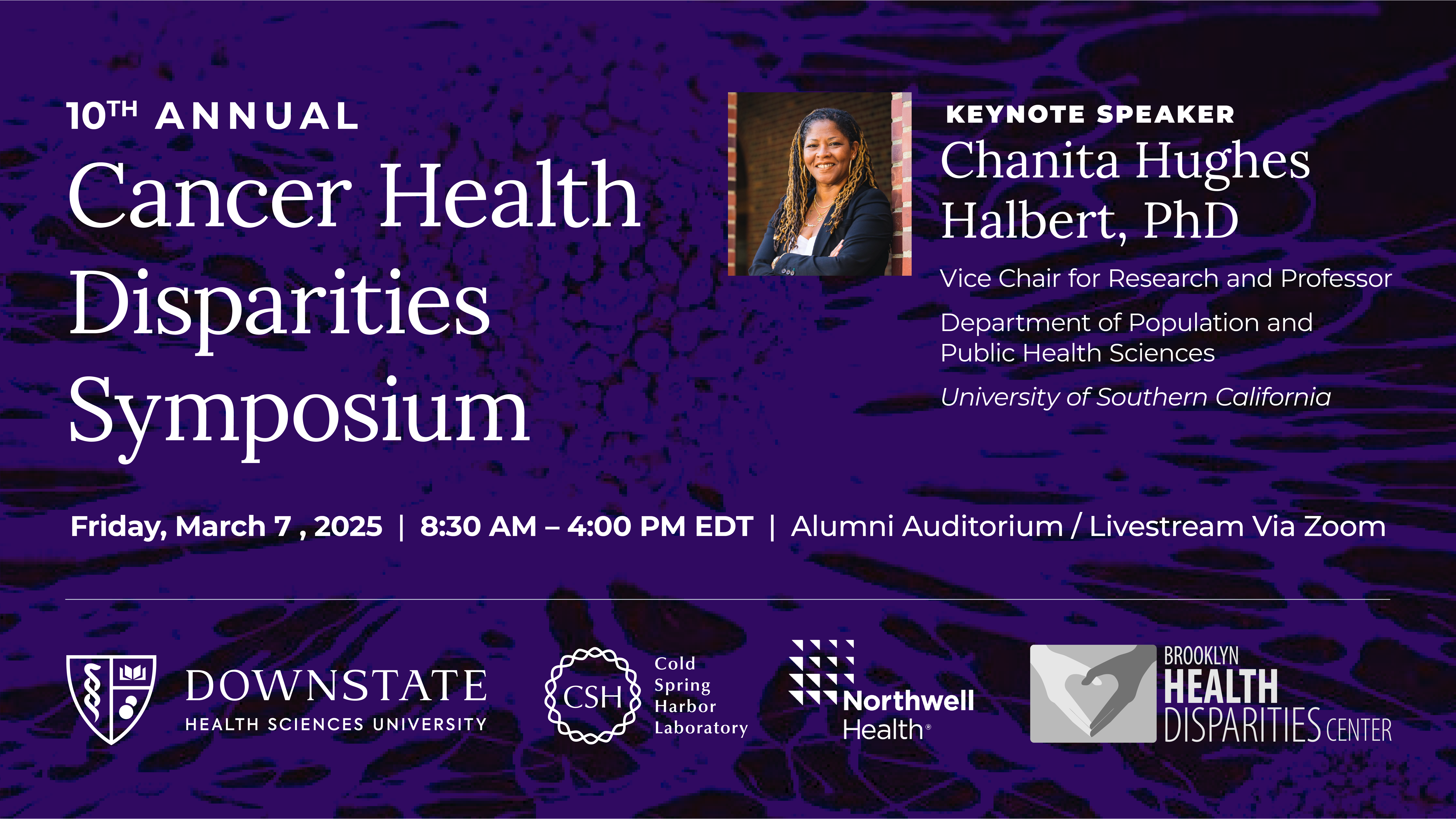Downstate Marks 10 Years of Advancing Cancer Equity with Nationally Recognized Symposium
By Office of the President | Mar 25, 2025

Downstate recently hosted the 10th Annual Cancer Health Disparities Symposium, welcoming physicians, scientists, nurses, trainees, students, and community members for a day of learning and collaboration centered on addressing the ongoing disparities in cancer outcomes, particularly those affecting African American communities.
Co-sponsored by the Department of Medicine/Division of Gastroenterology, the Brooklyn Health Disparities Center, and Cold Spring Harbor Laboratory, the symposium is the only event of its kind in the United States dedicated to examining both the biological and social factors that contribute to the elevated cancer incidence and mortality rates among African Americans.
The program began with Opening Remarks from Dr. Salifu and F. Charles Brunicardi, M.D., FACS, Senior Vice President and Dean of the College of Medicine. Both leaders emphasized the critical role of academic medical centers in driving equitable research practices and engaging communities in meaningful and inclusive ways.
This year’s theme, “Cancer Clinical Trials,” explored the importance of diversity in clinical research and its impact on achieving more equitable outcomes in cancer diagnosis, treatment, and survival.
Chanita Hughes-Halbert, Ph.D., Vice Chair for Research and Professor in the Department of Population and Public Health Sciences at the Keck School of Medicine, University of Southern California, delivered the Keynote Address. Dr. Hughes-Halbert, a nationally recognized expert in cancer disparities, presented “Translational Research in Cancer Health Equity,” which examined the integration of behavioral science, community engagement, and precision medicine to improve cancer care for underrepresented populations.
Later in the program, Lauren E. McCullough, Ph.D., MSPH, Visiting Scientific Director at the American Cancer Society, introduced the audience to the VOICES of Black Women Study—a new national research initiative aimed at improving cancer prevention and survivorship among Black women by capturing their lived experiences and health trajectories.
The symposium was organized into three main sessions: Session 1: Colorectal Cancer, Session 2: Cancer Clinical Trials, and Session 3: Pancreatic Cancer. Each session featured expert-led presentations and panel discussions. Participating speakers represented leading research institutions, including Cold Spring Harbor Laboratory, Weill Cornell Medicine, Yale University School of Medicine, Memorial Sloan Kettering Cancer Center, Henry Ford Pancreatic Cancer Center, and NYU Grossman School of Medicine.
A poster session during the lunch break gave students and trainees a platform to showcase their research and receive feedback from senior investigators and peers.
In the Closing Remarks, Dr. Salifu was joined by David Tuveson, M.D., Ph.D., Director of the Cancer Center at Cold Spring Harbor Laboratory and Chief Scientist of The Lustgarten Foundation for Pancreatic Cancer Research. To mark the symposium’s 10th anniversary, the organizers presented special recognition awards to long-standing contributors to cancer equity research:
- John M. Carethers, M.D., Vice Chancellor for Health Sciences at the University of California, San Diego, and former Chair of Medicine at the University of Michigan
- Antonio Baines, Ph.D., Associate Professor of Biological and Biomedical Sciences at North Carolina Central University
- Laura Martello-Rooney, Ph.D., Director of Gastrointestinal Research at Downstate
These eminent researchers continue to play pivotal roles in expanding the national dialogue on cancer disparities, advancing a shared mission of equity-driven science and community impact.
As it marks a decade of progress, the Cancer Health Disparities Symposium continues to serve as a vital platform for learning, collaboration, and innovation. Downstate remains steadfastly committed to supporting research, training, and community outreach that eliminate cancer disparities and improve outcomes for all.
Tags: Health Disparities, Cancer